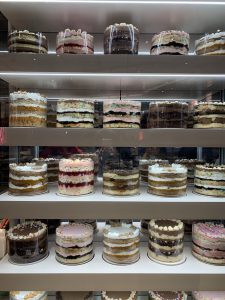
Variations on a cake. Photo Credit: Isabel Wong
On October 31, 2020 I will become my sister.
We’re dressing up as each other for Halloween, which means I’ll have to wear leggings in 80ºF heat. More than a simple clothes swap, I’ll attend dance class and learn 75% of Hamilton lyrics. Boba will govern my stomach, thoughts of getting a puppy my dreams.
Conversely, my sister will wear too small shirts coupled with too large pants, everything that fits me still boxed in New York. She’ll wake up before the sun at 5 a.m. and sigh always and loudly. Writing a single email will take her two hours.
While I’m known for spending a long time writing emails, I don’t spend two hours. Important emails containing cover letters or recommendation requests or, as I wrote about in my previous post, asking a professor to advise you take me around 30 minutes. These types of emails were new to me as a first-year, are still unfamiliar to me even as a senior, so I often find myself at a loss for words. When I’m lacking my own, I try to fill myself up with others’, clicking through university website guides, job databases, Quora debates. While each site will tell me something a little bit different, no matter which The Balance Careers Monster Indeed SimplyHired CareerBuilder Glassdoor I open, templates greet me.
I resist the urge to copy and paste my way to a quick escape, which would not only constitute plagiarism, but would also make for a too generic, ineffective email. Rather, I allow myself to skim through these templates, stopping at phrases I like and others I dislike so that when it’s time to drag my cursor across the page, I’m no longer empty, but filled with others’ bits and pieces. Writing an email is no longer a feat of invention when you have someone to work off of or oppose, their phrases anchors around which I craft, and sculpt, and turn. Rather than clogging my mouth, their words allow me to use mine. Sometimes writing is easiest when it becomes talking. Sometimes you’re just waiting for someone to make the first move.
The other day in Senior Seminar, our professor had us try to articulate our research problem using a template from Kate Turabian’s A Manuel for Writers of Research Papers, Theses, and Dissertations. It was like Mad Libbing. Our professor only gave us a few minutes to try and wrangle our sprawling topics into the compartments of “I am working on … because I want to find out … so that I can help others understand …” While what I produced is far from publishable, the exercise made the process of articulating a lot less daunting. I have something to work off of, a foundation built out of a template. Bringing my problem into focus is now just a matter of substantial tinkering, of rejecting, adding, and revising the pre-existing.
You needn’t read a textbook or a database to find a template. I imagine the most compelling ones are those you stumble upon organically anyway.
While reading the introduction to a text a professor recommended for my research, I was struck by how the author communicates her project. She summarizes her site of study and the attending structures she will interrogate succinctly and clearly. I could only aspire to write such an effective sentence. Impulsively, I copied her sentence, word for word, into my research journal.
Then, adhering to her original as closely as possible, I attempted to replace the sections specific to her project with what I consider my research’s parallel elements. While I still haven’t reached a final articulation, this “DIY” template pushed me to specify what, exactly, is my site of study. Using another DIY template, a claim I found particularly cogent, led me to question my working hypothesis. The template’s language is causal. My hypothesis’s language was expressive. In hewing to the template’s wording, I realized I hadn’t really considered the nature of the relationship I was tracing. I was simply running on default language instead.
Templates are discouraged, even prohibited, in most academic and professional situations. While I’m not saying we should replace our words with another’s, I hope we can destigmatize templates’ usage as a tool of thought and craft. Using templates, often derided as stifling and simplistic, has sharpened and widened my thinking. Playgrounds upon which we can play intellectually without the messiness of crafting new language, templates, through others’ words, help me find mine.
